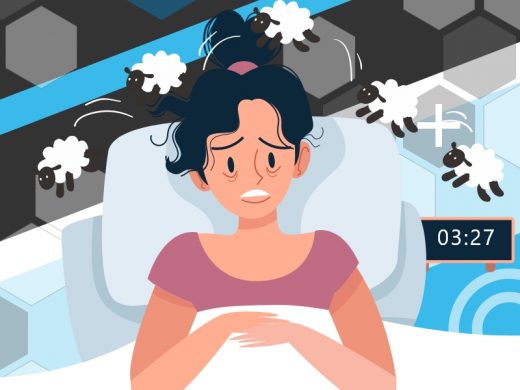
Having insomnia is a sleep disorder where you find it difficult to fall asleep, it’s hard to stay asleep, or you wake up too early and can’t sleep again. Insomnia can sap not only your energy level and mood but also your health, work performance, and quality of life.
Insomnia is usually the result of stress or a traumatic event. But some people have long-term insomnia that lasts for a month or more. Insomnia could be the main problem or could be related to other medical conditions.

Symptoms of Insomnia
- Difficulty falling asleep at night
- Waking up during the night or waking up too early
- Not feeling well-rested after sleeping
- Tiredness and sleepiness during daytime
- Irritability, depression, or anxiety
- Difficulty paying attention
- Forgetfulness
- Increased errors or accidents
- Ongoing worries about sleep
What are the Six Types of Insomnia?
- Primary insomnia. It means your sleep issues aren’t related to any health problems.
- Secondary insomnia. These problems can be caused by a health condition, pain medication, or substance abuse.
- Sleep-onset insomnia: This means you have trouble getting to sleep.
- Sleep-maintenance insomnia. Having trouble sleeping through the night or waking up too early can lead to this problem.
- Mixed insomnia. It causes trouble both falling asleep and staying asleep through the night.
- Paradoxical insomnia. You underestimate your sleep time. It feels like you sleep a lot less than you really do.

What are the Causes of Insomnia?
Common causes of chronic insomnia include:
- Stress. Concerns about work, school, health, finances, or family can keep your mind active at night, making it difficult to sleep.
- Poor sleep habits. In addition to irregular sleep habits, poor sleep habits include naps, stimulating activities before bedtime, and an uncomfortable sleeping environment that can interfere with your sleep cycle.
There may also be a connection between chronic insomnia and medical conditions or the use of certain medications. Treating the medical condition may help improve sleep. Additional common causes of insomnia include:
- Mental health disorders. Sleep can be disrupted by anxiety disorders, such as post-traumatic stress disorder.
- Medications. Many prescription drugs can interfere with sleep, such as certain antidepressants and medications for asthma or blood pressure.
- Medical conditions. Examples of conditions linked with insomnia include chronic pain, cancer, diabetes, heart disease, and asthma.
- Sleep-related disorders. Your breathing stops periodically during sleep due to sleep apnea, interrupting your sleep.
Diagnosing Insomnia
- A physical exam may be performed by your doctor if the cause of insomnia isn’t known.
- As part of your sleep evaluation, your doctor may ask you questions about sleep and wakefulness patterns, and your level of daytime sleepiness.
- Sleep center may be necessary if you are experiencing insomnia or other sleep disorders, such as sleep apnea and restless legs syndrome. Tests are done to monitor and record a variety of body activities while you sleep.
Treatment for Insomnia
Changing your sleep habits and addressing any issues that may be associated with insomnia, can restore restful sleep for many people. There are over-the-counter medications available for insomnia. You can also use Herbal Tea Sleep to help you sleep.









